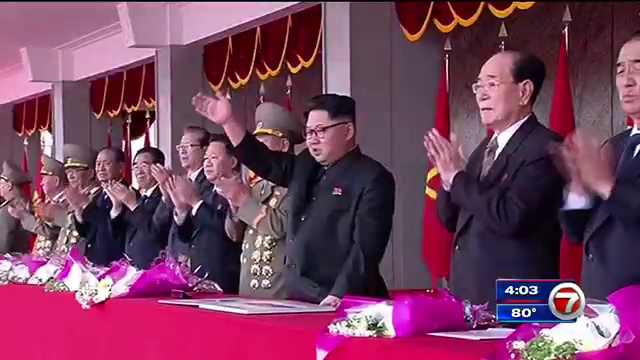UNITED NATIONS (AP) — The U.N. Security Council was scheduled to vote late Monday on a new, watered-down sanctions resolution against North Korea that eliminates initial U.S. demands to ban all oil imports to the country and freeze international assets of the government and its leader Kim Jong Un.
The draft resolution, agreed to late Sunday after final negotiations between the U.S. and China, the North’s ally and main trading partner, also eliminates a U.S. proposal to authorize the use of force to board and inspect nine named ships, which it said violated previous U.N. sanctions resolutions.
The resolution to be voted on represents a swift response to North Korea’s recent nuclear test, which it says was a hydrogen bomb, and to its escalating launches of increasingly sophisticated ballistic missiles it says can reach the United States.
But its provisions are a significant climb-down from the toughest-ever sanctions the Trump administration proposed in the initial draft resolution it circulated last Tuesday, especially on oil,where a complete ban could have crippled the country’s economy.
It would ban North Korea from importing all natural gas liquids and condensates. And it would cap Pyongyang’s imports of refined petroleum products at 2 million barrels a year, and crude oil at the level of the last 12 months.
According to the U.S. Energy Information Administration, China supplies most of North Korea’s crude oil imports. It cited U.N. customs data showing that China reported sending 6,000 barrels a day of oil products to North Korea, which the agency said is mostly gasoline and diesel fuel vital to the country’s agriculture, transportation and military sectors.
That would mean North Korea imports nearly 2.2 million barrels a year in petroleum products, so the 2 million cap in the resolution would represent a 10 percent cut.
The final draft would ban also all textile exports and prohibit all countries from authorizing new work permits for North Korean workers — two key sources of hard currency. It would prohibit all new and existing joint ventures and cooperative arrangements with a single exception.
Textiles are North Korea’s main source of export revenue after coal and other minerals which have already been severely restricted by previous U.N. resolutions.
North Korean textile exports in 2016 totaled $752.5 million, accounting for about one-fourth of its total $3 billion in merchandise exports, according to South Korean government figures.
The original U.S. draft would have ordered all countries to impose an asset freeze and travel ban on Kim Jong Un and four other top party and government officials. The new draft would add only one person to the sanctions list — Pak Yong Sik, a member of the Workers’ Party of Korea Central Military Commission, which controls the country’s military and helps direct its military industries.
The original U.S. draft would also have frozen the assets of North Korea’s state-owned airline Air Koryo, the Korean People’s Army, and five other powerful military and party entities. The new draft drops sanctions on the airline and army and would only add the Central Military Commission of the Workers’ Party of Korea and the party’s powerful Organization and Guidance Department and its Propaganda and Agitation Department to the sanctions blacklist.
North Korea’s Foreign Ministry issued a statement early Monday saying it was watching the United States’ moves closely and warned that it was “ready and willing” to respond with measures of its own. It said the U.S. would pay a heavy price if the sanctions proposed by Washington are adopted.
Britain’s U.N. Ambassador Matthew Rycroft told reporters who questioned the watering down of the initial U.S. text that “there is a significant prize in keeping the whole of the Security Council united and I very much hope that all my council colleagues will vote in favor of the revised draft.” He said he expects China and Russia to support it.
Rycroft called the resolution “very robust” and “a very significant set of additional sanctions on imports into North Korea and exports out of North Korea and other measures as well.”
China and Russia had called for a resolution that focuses on a political solution to the escalating crisis over North Koreas nuclear program. They have proposed a freeze-for-freeze that would halt North Korean nuclear and missile tests in exchange for the U.S. and South Korea stopping their joint military exercises — but the Trump administration has rejected the initiative.
Russia has argued that sanctions aren’t working and President Vladimir Putin expressed concern last week that a total oil cutoff could hurt the North Korean people.
The final draft adds new language urging “further work to reduce tensions so as to advance the prospects for a comprehensive settlement,” and underscoring “the imperative of achieving the goal of complete, verifiable and irreversible denuclearization of the Korean Peninsula in a peaceful manner.”
It retains language reaffirming support for long-stalled six-party talks with that goal between North Korea, the U.S., Russia, China, Japan and South Korea.
The final draft also adds language underscoring the Security Council’s commitment to North Korea’s sovereignty and territorial integrity, to “a peaceful and diplomatic solution to the situation,” and “its concern that developments on the Korean Peninsula could have dangerous, large-scale regional security implications.”
The revised resolution retains language on the council’s “determination to take further significant measures” in the event of a new nuclear test or ballistic missile launch.
Copyright 2024 The Associated Press. All rights reserved. This material may not be published, broadcast, rewritten or redistributed.

